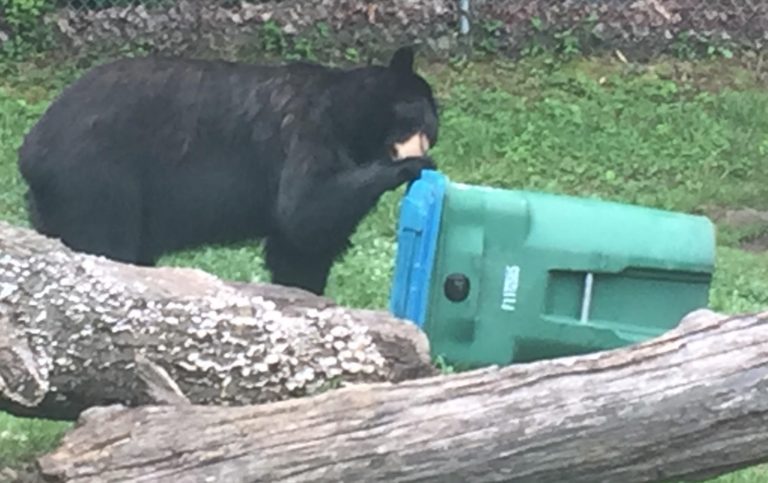Asheville bear Zoom discussion
Pack Memorial Library will host a Zoom BearWise at Home
presentation virtually from 4 to 5 p.m. May 13. Visit https://www.facebook.com/events/832450390581893.
To join the Zoom meeting visit , https://zoom.us/j/96568183392.
Meeting ID: 965 6818 3392. Password: Bears!
You can dial in to listen as well. Find your local number: https://zoom.us/u/abL4yn0xjD. Meeting ID: 965 6818 3392. Password: 316449.
Distributed in partnership with N.C. Wildlife Resources Commission
Black bear sightings have become increasingly common throughout the state, including Asheville. Spring is especially a time people may encounter bears emerging from winter hibernation, as the bears begin moving through residential areas searching for food.
With more people staying home due to COVID-19, biologists with the N.C. Wildlife Resources Commission expect more sightings in neighborhoods and are reminding people to be “BearWise” if they encounter a bear.
If left alone, most bears that wander into a neighborhood will quickly retreat to their natural habitat, particularly if no food source is around. While bears are rarely threatening towards people and are, in fact, quite wary of people, biologists say it is important to be cautious and follow the six “BearWise Basics” to prevent potential conflicts and live responsibly with bears.
Never feed or approach a bear — either intentionally or unintentionally
Feeding bears trains them to look for food by approaching homes and people. Bears are particularly attracted to bird seed, hummingbird feeders, garbage and other human-associated foods, like pet food. Bears will defend themselves if a person gets too close, so do not risk your safety or theirs. People should also follow these other BearWise Basics:
- Secure food, garbage and recycling. Food and food odors attract bears so don’t reward them with easily available food or garbage. Store bags of trash inside cans in a garage, shed or other secure area; or use garbage cans or trash containers with a secure latching system or that are bear resistant, if possible. In Asheville, residents should not place trash carts out the night before collection. Trash should be put out by 7 a.m. on the day of your scheduled collection.
- The City of Asheville currently does not provide bear-resistant trash containers. Contact the Sanitation Division at 828.259.5857 or the N.C. Wildlife Resource Commission for information on how to obtain bear-resistant trash containers that are compatible with the City’s collection system.
- Remove bird feeders when bears are active. Birdseed, other grains and hummingbird feeders have high calorie content making them very attractive to bears.
- Never leave pet food outdoors. If you feed pets outdoors, remove the empty food bowl after feeding.
- Clean and store grills. Once the grill is clean, store it in a bear-resistant location, like a garage or shed.
What to do if you encounter a bear
If you do encounter a bear, the most important thing to do is leave it alone, according to Colleen Olfenbuttel, the Commission’s black bear and furbearer biologist.
“Don’t try to feed or approach the bear — we can’t stress this enough,” Olfenbuttel said. “Approaching or cornering a bear can unnerve it, perhaps causing it to act defensively.”
The agency does not trap and relocate bears. If a bear is an actual problem, moving the bear only moves the problem rather than solving the underlying issue.
For more information about living responsibly with black bears, visit www.bearwise.org. For more information about black bears in North Carolina, visit ncwildlife.org/bear. For questions regarding bears and other human-wildlife interactions, call the Commission’s N.C. Wildlife Helpline toll-free at 866-318-2401 from 8 a.m. to 2 p.m. weekdays.
Due to the COVID-19 virus, the counter at the Wildlife Commission’s headquarters in Raleigh is closed. For the most up-to-date information on agency-related closures, cancellations and postponements visit ncwildlife.org/covid19.
